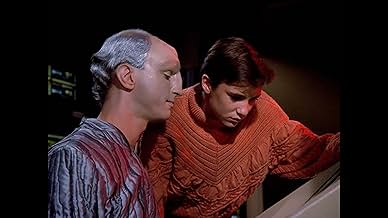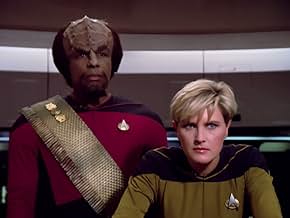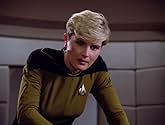Everyone accurately pegs a visiting propulsion scientist as a charlatan, but only Wesley Crusher recognizes his alien assistant as the real deal.Everyone accurately pegs a visiting propulsion scientist as a charlatan, but only Wesley Crusher recognizes his alien assistant as the real deal.Everyone accurately pegs a visiting propulsion scientist as a charlatan, but only Wesley Crusher recognizes his alien assistant as the real deal.
James G. Becker
- Youngblood
- (uncredited)
Byron Berline
- Officer playing Violin
- (uncredited)
Darrell Burris
- Operations Officer
- (uncredited)
Featured reviews
This is one of the better season 1 episodes. Wesley has a nice new orange sweater and what look like corduroy pants but not quite. Turns out Wesley is a warp field Mozart with an intuitive grasp of the interrelated nature of space, time, and thought. A hidden relationship between thought and the material world is a recurring theme in Star Trek that I rather like.
It's also hard not to compare and contrast the The Traveler with Q as they are both member's of species that live unconstrained by time. Portal and Nagilum also come to mind as it seems season 1 is all about humanity being tested and examined by beings with greater knowledge and power.
I think I am beginning to understand what's going on with Wesley. As a character, he is given more attention than the main cast we come to know and love by the end of the show. Why? Brace yourself for some grade A armchair psychology:
Wesley is Gene Roddenberry romanticizing a childhood he wished he himself had had. Roddenberry projected his idealized version of the future onto the world through Star Trek, and an idealized version of his childhood through Wesley. He gives Wesley the extra attention he wished he would have gotten as a boy, and we hate Wesley because we know he doesn't deserve the attention that he gets. He hasn't earned it. He's the kid who got the blue ribbon because he tried hard and the adults felt sorry for him, not because he was actually any good. We are repeatedly told he is wonderful and special, but we hate him because it never feels true.
Wesley might have worked as a character if he had been fleshed out over the course of the entire season. Seeing him earn the commission of acting ensign might have been satisfying if it took place in episode 26, perhaps after some act of valor. Instead, he's got it by episode 5 after looking over an alien's shoulder, and it just feels forced.
Verdict: Watchable and memorable, but irksome.
Fun Facts:
The Hubble can see well over ten billion light years, nine times further than Picard's estimate of the distance the Enterprise traveled in this episode.
The distance to M33 is accurately stated according to the internet.
If it takes 300 years to travel the 2.7 million light years we can approximate maximum warp to a little bit more than one light year per hour. 2,700,000 div 300 year gives 9000 light years per year. Div 365 gives 24.65 ligh years per day. Div 24 gives 1.027 light years per hour. WooWee!
Subspace radio speed can be calculated in a similar manner. 2,700,000 div 52 years (10 months and 9 weeks, really Data!?) is 5.92 light years per hour.
It's also hard not to compare and contrast the The Traveler with Q as they are both member's of species that live unconstrained by time. Portal and Nagilum also come to mind as it seems season 1 is all about humanity being tested and examined by beings with greater knowledge and power.
I think I am beginning to understand what's going on with Wesley. As a character, he is given more attention than the main cast we come to know and love by the end of the show. Why? Brace yourself for some grade A armchair psychology:
Wesley is Gene Roddenberry romanticizing a childhood he wished he himself had had. Roddenberry projected his idealized version of the future onto the world through Star Trek, and an idealized version of his childhood through Wesley. He gives Wesley the extra attention he wished he would have gotten as a boy, and we hate Wesley because we know he doesn't deserve the attention that he gets. He hasn't earned it. He's the kid who got the blue ribbon because he tried hard and the adults felt sorry for him, not because he was actually any good. We are repeatedly told he is wonderful and special, but we hate him because it never feels true.
Wesley might have worked as a character if he had been fleshed out over the course of the entire season. Seeing him earn the commission of acting ensign might have been satisfying if it took place in episode 26, perhaps after some act of valor. Instead, he's got it by episode 5 after looking over an alien's shoulder, and it just feels forced.
Verdict: Watchable and memorable, but irksome.
Fun Facts:
The Hubble can see well over ten billion light years, nine times further than Picard's estimate of the distance the Enterprise traveled in this episode.
The distance to M33 is accurately stated according to the internet.
If it takes 300 years to travel the 2.7 million light years we can approximate maximum warp to a little bit more than one light year per hour. 2,700,000 div 300 year gives 9000 light years per year. Div 365 gives 24.65 ligh years per day. Div 24 gives 1.027 light years per hour. WooWee!
Subspace radio speed can be calculated in a similar manner. 2,700,000 div 52 years (10 months and 9 weeks, really Data!?) is 5.92 light years per hour.
The Enterprise's engines are tested by a Federation expert and his assistant in order to boost the ship's engines. When the initial test run goes wrong, the ship finds itself marooned in an area of space far beyond what has previously been explored.
The first episode to really expose Wesley Crusher's role on the ship as a "solve-all", this episode feels far closer to the spirit of the original series than the previous episodes as it explores the human condition as well as the perils of deep, deep space. The effects are a little clunky but the script makes up for it and is easily one of the best season one episodes thus far.
The first episode to really expose Wesley Crusher's role on the ship as a "solve-all", this episode feels far closer to the spirit of the original series than the previous episodes as it explores the human condition as well as the perils of deep, deep space. The effects are a little clunky but the script makes up for it and is easily one of the best season one episodes thus far.
The Next Generation had a very bad start. This episode marks the first glimmer of what this series would become and why I love it: a great mix of fantastic storytelling, sciencefiction and philosophy.
A true science fiction episode where time, space, and an interesting third element are explored. Really enjoyed this one. A nice break from the usual political and social dramas. Some significant character development for Wesley as well.
This episode of TNG has visiting scientist Stanley Kamel better known as Dr. Kroeger from Monk aboard the Enterprise. He's a scientist who's quite full of himself even though both Commander Riker and Data question the validity of his claims that he can increase the travel capabilities of the Enterprise exponentially. But his assistant Eric Menyuk has everyone's curiosity aroused. All but Wil Wheaton who accepts Menyuk at face value and becomes his friend.
The experiment does succeed, but it flings the Enterprise millions of light years from earth to a galaxy where strange thing are happening. It's all to do with the Traveler as Menyuk is called. What can he do to reverse the situation?
A favorite TNG episode of mine. And it has a lot to do with the further adventures and maturing of callow youth Wesley Crusher.
The experiment does succeed, but it flings the Enterprise millions of light years from earth to a galaxy where strange thing are happening. It's all to do with the Traveler as Menyuk is called. What can he do to reverse the situation?
A favorite TNG episode of mine. And it has a lot to do with the further adventures and maturing of callow youth Wesley Crusher.
Did you know
- TriviaAfter the first jump, LaForge says that the Enterprise has traveled a distance of 2.7 million light years, ending up on the far side of the Triangulum galaxy, a.k.a. M-33. The distance to M-33 was very uncertain at the time this episode was made, with estimates varying between 2 and 3 million light years. Interestingly, the best modern estimates are indeed concentrated around 2.7-2.8 million light years.
- GoofsWhen Kosinski enters the bridge after his 'experiment' unexpectedly sends the Enterprise to another galaxy, he begins explaining the process by which this error occurred. He states that "as the power grew, [he] applied the power 'asymptomatically'" which would imply that he applied power with no symptoms or otherwise discernible effects. It seems far more likely that the script read "applied the power 'asymptotically'", meaning that the power application tended to some arbitrary limit (the term 'asymptote' is often used in mathematics to describe the curve of a graph tending toward infinity).
- Quotes
Lt. Commander Data: Captain, we're here. Why not avail ourselves of this opportunity for study? There is a giant protostar here in the process of forming. No other vessel has been out this far.
Captain Jean-Luc Picard: Spoken like a true Starfleet graduate.
- ConnectionsReferenced in Star Trek: Voyager: Caretaker (1995)
- SoundtracksStar Trek: The Next Generation Main Title
Composed by Jerry Goldsmith and Alexander Courage
Details
- Runtime
- 45m
- Color
- Sound mix
- Aspect ratio
- 1.33 : 1
Contribute to this page
Suggest an edit or add missing content


























